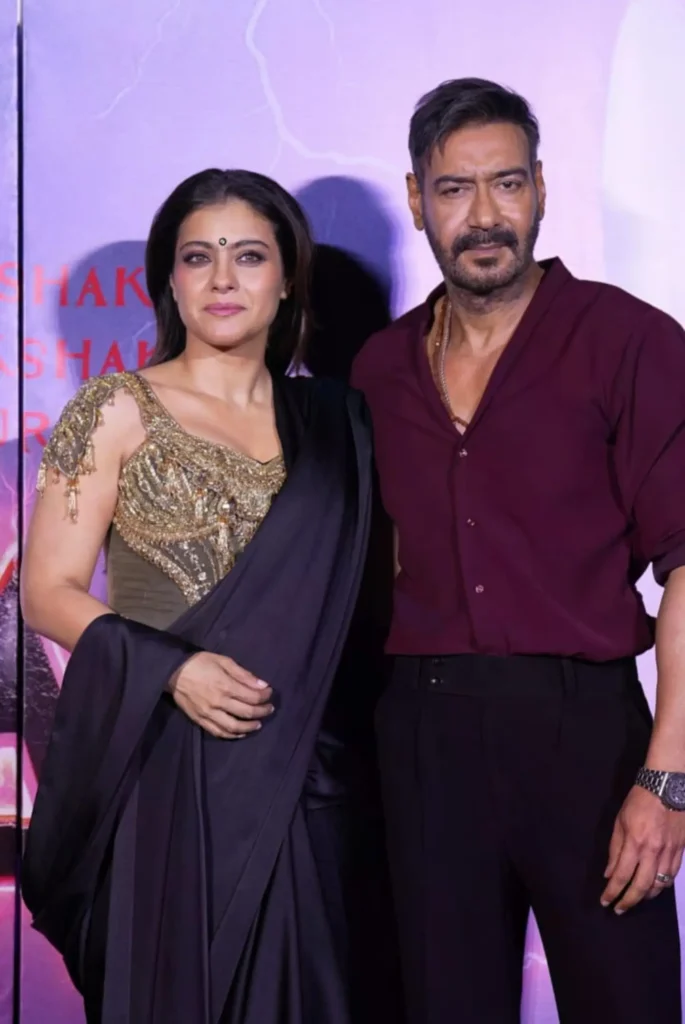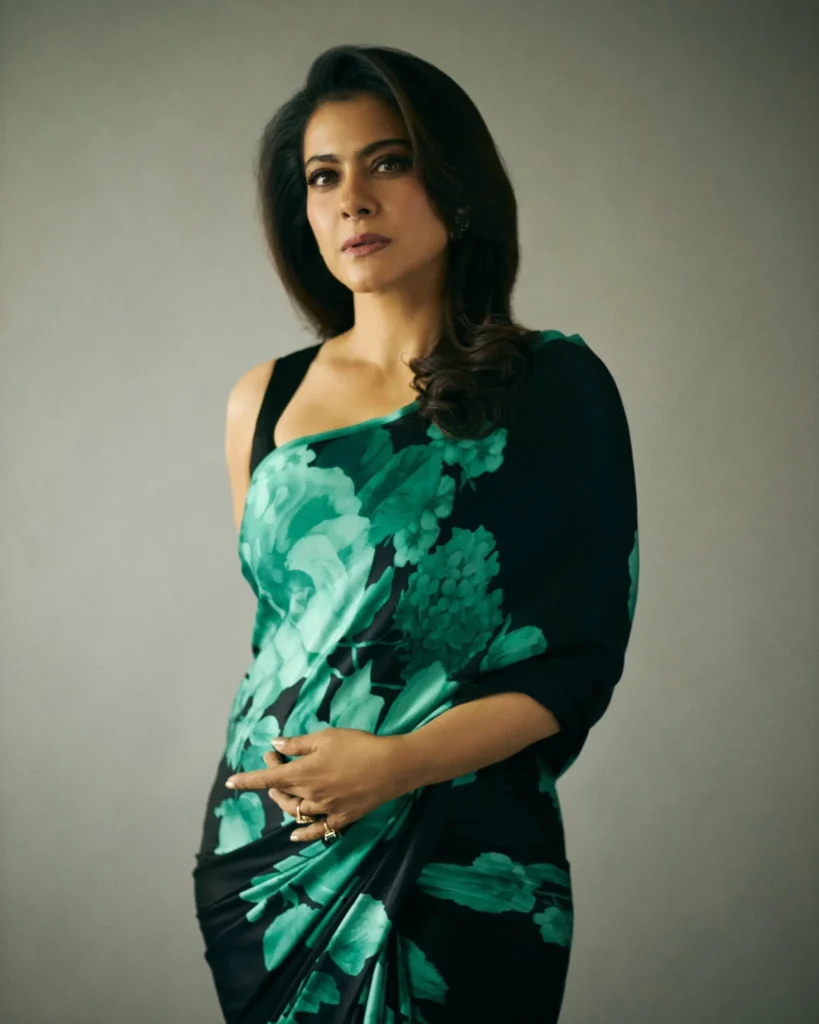Striking a Balance: Kajol’s Stand in Bollywood’s Work-Hour Controversy.
Table of Contents
The Bollywood industry is buzzing with a heated debate over work hours, sparked by reports of Deepika Padukone’s alleged exit from Sandeep Reddy Vanga’s Spirit due to disagreements over an eight-hour workday. As the conversation gains traction, veteran actor Kajol has stepped into the spotlight, sharing her own experiences as a working mother who prioritized work-life balance since the 1990s. Known for her candidness, Kajol revealed how she navigated long shoots, motherhood, and personal challenges with the support of her family and understanding producers. Her insights, coupled with husband Ajay Devgn’s recent comments, offer a fresh perspective on an issue reshaping Bollywood’s work culture. Here’s the full story behind Kajol’s journey and the industry’s evolving stance on work hours.

Kajol’s Upcoming Venture: Maa Set to Haunt Theaters
Adding to her storied career, Kajol is gearing up for the release of her next film, Maa, a mythological horror story directed by Vishal Furia, slated to hit theaters on June 27, 2025. Produced by Ajay Devgn under Devgn Films, the film promises a chilling narrative and will be released in Hindi, Bengali, Tamil, and Telugu, catering to a diverse audience across India. As Kajol steps into this new role, her advocacy for work-life balance resonates, showcasing how she continues to balance high-profile projects with personal priorities, setting a powerful example for the industry.
Kajol’s Approach: One Film at a Time
Kajol has always been a trailblazer in managing her career. In a recent interview with PTI, the 50-year-old actor reflected on her deliberate choice to work on one film at a time, a rarity in an industry where actors often juggle multiple projects. “I was one of the few people who worked on one film at a time; I didn’t do four films at the same time like other actors,” she said. “I used to finish one film, then start another. I didn’t work for 20 or 30 hours.”
This disciplined approach, Kajol emphasized, was rooted in her commitment to work-life balance, a principle she upheld from her debut in the 1990s. Supported by her mother, veteran actor Tanuja Mukherjee, Kajol set clear boundaries, ensuring she never endured grueling 20- or 30-hour shifts. “I was always very clear that we would work a certain amount only, and my mom backed me up big time on it,” she told PTI. Her stance challenges the industry’s long-standing culture of marathon shoots, aligning with the current push for shorter, more humane work hours.
Motherhood and Movies: Kajol’s Post-Nysa Experience
The birth of her daughter Nysa in 2003 marked a pivotal moment for Kajol, who was then filming Fanaa alongside Aamir Khan. As a new mother, she faced the daunting task of balancing motherhood with demanding film schedules. Yet, Kajol found an ally in her peers and producers, who accommodated her needs without hesitation. “I remember having this discussion, and most producers are so okay, they don’t even think twice,” she shared with PTI.
During the Fanaa shoot in 2006, Kajol noted that her schedule was adjusted seamlessly. “Everyone worked comfortably around my schedule without making it an issue or including it in the contract,” she said. This flexibility, she added, was a testament to the industry’s willingness to support actors during personal milestones. Her experience contrasts with the reported tensions on Spirit, where Deepika Padukone, a new mother herself, allegedly clashed with Vanga over an eight-hour shift request.

A Supportive Industry: Kajol’s Stories of Understanding
Kajol’s reflections extend beyond Fanaa. While shooting U Me Aur Hum in 2008, produced by her husband Ajay Devgn, she faced a personal crisis with her father hospitalized and Nysa just two years old. Ajay ensured she could leave the set early to visit the hospital, allowing her to balance work and family. “The producers I worked with were extremely understanding,” Kajol told PTI, recalling how they permitted early wrap-ups when personal challenges arose.
These experiences, Kajol said, highlight the compassion within Bollywood’s often high-pressure environment. “I’ve had wonderful experiences, with most people understanding and accommodating my needs,” she concluded. Her stories underscore a key point in the work-hour debate: supportive producers can make a significant difference, especially for actors navigating parenthood.
Ajay Devgn’s Take: A Producer’s Perspective
The work-hour debate gained further attention at the trailer launch of Maa, where Ajay Devgn fielded questions about actors, particularly new mothers, seeking shorter shifts. His response, which briefly overshadowed Kajol’s attempt to speak, went viral, with some noting he appeared to “silence” her. “It’s not that it’s not going down well with people,” Ajay said, defending the industry. “Most honest filmmakers will not have problems with it. Being a mother and working for eight hours, most people have started working eight-nine hour shifts.”
Ajay’s comments suggest a shift in Bollywood’s work culture, with many filmmakers adapting to reasonable hours. As a producer and actor, his support for Kajol’s needs during U Me Aur Hum reinforces his stance that accommodating actors is feasible without compromising a project’s quality.
The Deepika Padukone Controversy: Igniting the Debate
The catalyst for this discussion was Deepika Padukone’s reported exit from Spirit, a high-profile cop drama starring Prabhas and directed by Sandeep Reddy Vanga. Sources claimed Deepika, who welcomed her first child in 2024, requested an eight-hour workday, among other conditions, which clashed with Vanga’s expectations. This disagreement, coupled with creative differences, allegedly led to her departure, fueling a broader conversation about work hours in Bollywood.
Deepika’s stance resonates with a growing number of actors advocating for work-life balance, especially post-pandemic. The industry, known for 12- to 18-hour shoots, is now grappling with calls for reform, particularly from women balancing motherhood and careers. Kajol’s experiences, though from an earlier era, align with this push, showing that shorter hours are not a new demand but a long-standing practice for some.
Bollywood’s Work Culture: A Shift in Progress
The debate highlights a broader transformation in Bollywood. While long hours have been normalized, driven by tight schedules and budget constraints, actors like Kajol and Deepika are challenging the status quo. Kajol’s ability to work on one film at a time was a privilege not all actors enjoy, often requiring strong backing from family or industry clout. Her stories of supportive producers suggest that change is possible when collaboration and empathy guide production.
Ajay’s assertion that “most people have started working eight-nine hour shifts” points to an industry in transition. Films like Maa, produced with a focus on quality over quantity, may set a precedent for healthier work environments. However, challenges remain, as seen in the Spirit controversy, where differing visions can derail projects.
Kajol’s Legacy: A Role Model for Balance
Kajol’s reflections offer a beacon of hope for actors seeking balance. Her ability to maintain boundaries, supported by her mother, husband, and producers, showcases a model of success that prioritizes well-being. As she prepares for Maa, Kajol’s voice adds weight to the work-hour debate, encouraging a dialogue about sustainable practices in Bollywood.
Her experiences also highlight the importance of allyship. From Tanuja’s backing to Ajay’s production support, Kajol’s journey underscores how family and industry collaboration can empower actors to thrive. For new mothers like Deepika, Kajol’s story serves as a reminder that change, though gradual, is achievable with persistence and support.
What’s Next for Bollywood?
The work-hour debate is far from settled. As Bollywood evolves, filmmakers, actors, and producers must navigate how to balance creative demands with personal well-being. Kajol’s advocacy for shorter hours, backed by her lived experience, could inspire systemic change, especially for women in the industry. The success of films like Maa may prove that quality storytelling doesn’t require exhausting schedules.

The industry’s response to Deepika’s exit from Spirit will also shape future norms. If more actors demand reasonable hours, producers may adapt, fostering a culture where work-life balance is standard, not a privilege. For now, Kajol’s voice adds a powerful perspective, urging Bollywood to embrace change.
Join the Conversation
What do you think about Kajol’s approach to work-life balance? Should Bollywood adopt eight-hour shifts industry-wide? Share your thoughts below and let’s discuss the future of filmmaking!
Disclaimer: This article is based on reported events and aims to inform, not advocate. The views expressed do not reflect the opinions of this publication.
Sources: PTI, Hindustan Times, The Indian Express, Times of India, NDTV, India Today


